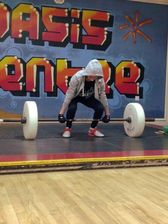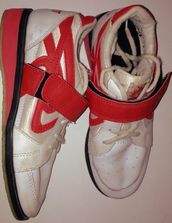AuthorA 20 year old fitness enthusiast and dedicated Olympic style weightlifter. I am a Level 2 Weightlifting coach, Powerlifter, and non-competitive Irish dancer. I'm determined to live a healthier lifestyle and take care of my body whilst influencing other young people to do so. I never doubt my ability to achieve something; I just change what I'm doing until I succeed. Archives
May 2021
|
Back to Blog
Before I began Olympic Weightlifting, I wasn’t really told the complete truth about the sport and the people participating in it. But over the years, I’ve began to understand a lot more about lifting involving things that help me and don’t help me. If you’re interested in my honest preferences and thoughts about Olympic Weightlifting, please continue reading. Your technique Many people think that Weightlifting revolves around how strong you are and how much weight you can lift. Partially, this is not the case. When you start Olympic Weightlifting, you can’t simply just pick up the bar. You will have to learn the technique for the two Olympic lifts, these are called the Snatch and the Clean and Jerk. Many lifters have different techniques, some which are excellent and some which are not so good. The idea of a good technique can increase the amount of weight you’re lifting quicker and can help prevent a fail in a competition. Technique is especially important for youths as without good technique, injuries and failed lifts can occur. If you are under the age of 13 years old and competing in a Weightlifting competition, your lifts will be based upon technique and scored with points rather than your Sinclair score or the biggest lift totalled together (note this may not apply to all Weightlifting rules in all countries). This is good because it gives young children a chance to improve their technique before beginning to lift heavier weights and can decrease the amount of pressure to lift a large amount for a child’s body which is constantly growing. Maths mattersWhen you’re training and not competing, working out much weight goes on the bar matters. Learning how to count up kilograms and the weight of the bar is a useful skill in Weightlifting. For children who are starting the sport, encouraging them to check the correct weights is useful and can help prevent any injuries. A barbell should be loaded evenly with the same weights and collars on the end, if the bar is loaded incorrectly (the weight is uneven or missing a collar) the bar may tip when lifted. Whereas, if you’re competing there will be loaders who work out the maths for you on the platform but if you’re in the warmup room you or your coach may have to do the maths. I still like to check the weight on the bar before lifting on the platform just incase someone has made a mistake. Shoes My well used Weightlifting shoes My well used Weightlifting shoes What you wear on your feet is very important when Olympic Weightlifting and your technique can often improve by wearing the correct footwear. It’s not that it’s a crime to wear trainers when Olympic lifting, however Weightlifting shoes are more appropriate for competing in. Some Weightlifting shoes can range from £45 to £160 and sometimes can take a little while to get used to. Weightlifting shoes are beneficial for the sport as the larger heel can help you to keep your balance whilst squatting. I purchased my Weightlifting shoes for £60 from a brand called Modifit, many people buy Adidas shoes but I wasn’t keen on the price. As long as your Weightlifting shoes have a heel, Velcro or buckle strap and a comfy sole I’m sure you’ll be fine. Everyone is differentWhether you’re entering competitions or not, you must remember that everyone is different. You’ll meet people who are in different body weight categories, different ages, all with different body types, different goals, different experiences, different techniques and different abilities. When Weightlifting, it is uncommon that everyone will have the same ability and weaknesses. Hence why there are different body weight categories for Men and Women. When you’re entering your first competition, do not feel disheartened if there is someone who can lift a lot more than you or if you are a heavier/lighter body weight than most people. You may all be different, but you all have one thing in common which is your love for lifting. FailureIn Weightlifting you will be over the moon one point and then next really disappointed, failure will always happen but you will learn from your mistakes. Whether you fail when attempting your personal best or mainly your technique wasn’t right, failure doesn’t summarise how good you are at lifting. If you fail, keep on trying and don’t give up as someday you’ll be able conquer that Pb or fix that technique mistake. Everyone fails at some point but its just a sign that you're getting close to where you want to be, lifting will never be straight up great and the road will be bumpy. These are some things which I wish I’d been told before Weightlifting. Have a good think about my reasons and it will give you an honest grasp of what to expect when starting the sport.
0 Comments
Read More
Your comment will be posted after it is approved.
Leave a Reply. |